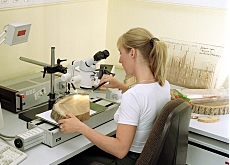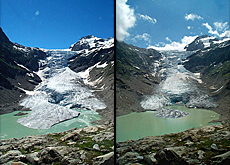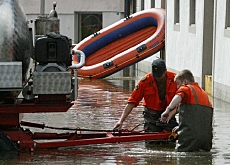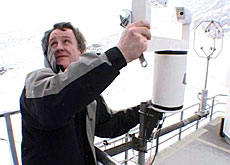Raindrops keep falling in greater numbers

Swiss researchers have discovered that levels of rain and snow increased significantly in many parts of the world during the 20th century.
It is hoped that climate models based on the researchers’ reconstructions will be able to predict droughts or floods far into the future.
“We discovered that with oxygen isotopes in tree rings from Asia we can reconstruct precipitation over the past millennium,” Kerstin Treydte, one of the researchers at the Swiss Federal Institute for Forest, Snow and Landscape Research, told swissinfo.
Treydte said the results showed some precipitation increase in the 19th and 20th centuries that was stronger than previous increases over the past millennium.
However these are not generalised results for the entire planet. The researchers worked in Northern Pakistan at an altitude of about 4,000 metres, where they were able to use juniper trees more than 1,000 years old.
The junipers there live in harsh, stony conditions and get their water only from rain, as there are no nearby streams or rivers.
But when it rains, the trees take in oxygen. This then gets deposited in the cellulose of the tree rings, reflecting the fluctuating relationship between various oxygen isotopes, which are different forms of the same element.
“It seems that in the long term there is some large-scale precipitation or moisture increase, but these records are all on the local to regional scale,” she said. “Worldwide this is the first 1000-year-old oxygen isotope record from tree rings.
“But […] this could be a hint that there is indeed an intensification of the hydrological cycle that is related to global warming, that the air has greater capacity to contain water vapour.”
So faced with global warming, is the world getting wetter as well as warmer?
“Not really. First of all we have too little data at the moment, and also because precipitation is a really complex climatic variable. There is evidence that there are many parts of the world with precipitation increases, but there are other parts with a decrease in precipitation.”
Networks
To amass more accurate data Treydte said the network of precipitation reconstructions across the world needs to be denser.
“For example […] we now have this evidence from the Himalaya region but it would be interesting to know what was going on in Switzerland and the Alps,” she added.
“An ongoing EU project has developed a network of isotopes records from tree rings across Europe covering some 25 sites. We are now trying to reconstruct some atmospheric patterns over Europe.”
Treydte explained that the laboratory analysis took around two years and was done at the Jülich Research Centre in Germany but that Swiss scientists in Birmensdorf played a central role.
“The Swiss Federal Institute for Forest, Snow and Landscape Research is known worldwide as one of the leading tree ring labs and has the skills to do paleoclimatology [the study of climate change on the scale of the entire history of the planet] and climate reconstruction.”
swissinfo, Thomas Stephens
Scientists at the Swiss Federal Institute for Forest, Snow and Landscape Research have discovered that levels of rain and snow increased significantly in many parts of the world during the 20th century.
They worked with scientists in Germany at the Jülich Research Centre, Bonn University and Potsdam University.
Their research will be published in this week’s edition of Nature, a science and medicine journal.

In compliance with the JTI standards
More: SWI swissinfo.ch certified by the Journalism Trust Initiative




You can find an overview of ongoing debates with our journalists here. Please join us!
If you want to start a conversation about a topic raised in this article or want to report factual errors, email us at english@swissinfo.ch.